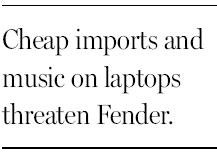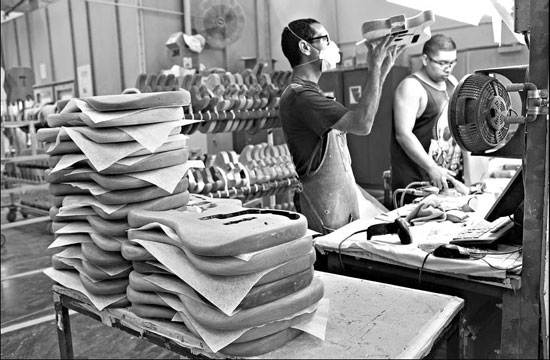Legendary guitar fights for a future
Updated: 2012-10-21 08:02
By Janet Morrissey(The New York Times)
|
|||||||
|
Fender, a favorite of rock stars, is facing challenges in a weak economy and a changing music industry. Monica Almeida / The New York Times |
In 1948, a radio repairman named Leo Fender took a piece of ash, bolted on a length of maple and attached an electronic transducer. You know the rest, even if you don't know you know the rest.
You've heard it - in the guitar riffs of Buddy Holly, Jimi Hendrix, George Harrison, Keith Richards, Eric Clapton, Pete Townshend, Bruce Springsteen, Mark Knopfler, Kurt Cobain and on and on.
It's the sound of a Fender electric guitar. Leo Fender's company, now known as the Fender Musical Instruments Corporation, is the world's largest maker of guitars. Its Stratocaster, which made its debut in 1954, is still a top seller. For many, the Strat's cutting tone and sexy, double-cutaway curves mean rock 'n' roll.
But Fender is struggling to hold on in a tight economy. Sales and profits are down. More than macroeconomics, however, is at work here. Fender, based in Scottsdale, Arizona, is also being buffeted by Wall Street.
A private investment firm, Weston Presidio, controls nearly half the company and has been looking for an exit. It pushed to take Fender public in March, to criticism that Fender was selling out. But, to Fender's embarrassment, investors balked. They were worried about the lofty price and about how Fender could keep growing.

And that is the crux of the matter. Times have changed, and so has music. Once, electric guitars powered rock and pop. Today, turntable rigs, drum machines and sampler synthesizers drive music like hip-hop. Electric guitars, huge as they are, have lost some of their old magic in this era of Jay-Z, Kanye West and "The Voice."
Fender has also been hurt by the economic slump in Europe, a region that accounts for 27 percent of net sales, and the situation there could hang over Fender for years.
Games like Guitar Hero have helped, but teenagers now make music on laptops.
Many of the guitars that are selling these days are made in places like China - ones that cost a small fraction of, say, a $1,599 Fender Artist "Eric Clapton" Strat, although Fender has been making its own lines of inexpensive guitars overseas for years.
"What possible niche is left unexploited by Fender?" asks Jeffrey Bronchick, founder of Cove Street Capital, an investment advisory firm in El Segundo, California, and the owner of some 40 guitars, including four Fenders.
Once Fender looked like the Pan Am of guitars, a storied name that might simply vanish. Leo Fender sold his company to CBS for $13 million in 1965, but Fender struggled in the ensuing years to maintain its identity inside a big corporation. Analysts said that Fender, under pressure to meet quarterly earnings numbers, made a series of cost cuts that caused quality to suffer and sales to nosedive.
Yamaha of Japan, meanwhile, began grabbing market share with inexpensive, high-quality guitars. In 1980, Fender posted a $10 million loss on only $40 million in sales.
Fender gradually clawed its way back up in the '80s and '90s, beefing up quality, training and oversight, and starting to manufacture guitars internationally, especially in Japan and South Korea. Restoring quality was crucial, says Bill Mendello, the former chief of Fender and today a member of its board. Artists like Mr. Clapton, who had modified his Strat "Blackie," were impressed with Fender's craftsmanship. Leo Fender died in 1991 at 82; in 2001, Weston Presidio swooped in, buying a 43 percent stake of Fender for $58 million.
One of the biggest competitors for new Fender guitars is old Fender guitars. Many players believe that the Fenders of the 1950s, the '60s and even the '70s, when analysts say quality suffered, have a special something. Prices of vintage Fenders have soared.

Rick Barrio Dill, the bassist for the soul and rock band Vintage Trouble, was frantic when his customized Fender Reissue Precision bass guitar was stolen last May. "It put a feeling in my stomach like someone had just died - I was a complete wreck," Mr. Dill remembers.
Duff McKagan, the former bassist for Guns N' Roses and Velvet Revolver, grew up listening to Led Zeppelin, Aerosmith and the Clash. He still plays the 1985 Fender Jazz Special he bought after Guns N' Roses landed its first record deal.
He can attest to the durability of Fenders. Once he tried to imitate Paul Simonon of the Clash by smashing his bass at the end of a show.
"I took a full swing and brought it down on this metal grate stage - and nothing happened," Mr. McKagan recalls. After 20 or so tries, one shard of wood came loose. "That was enough for me," he says. He never tried to smash a Fender again.
The New York Times
(China Daily 10/21/2012 page12)
